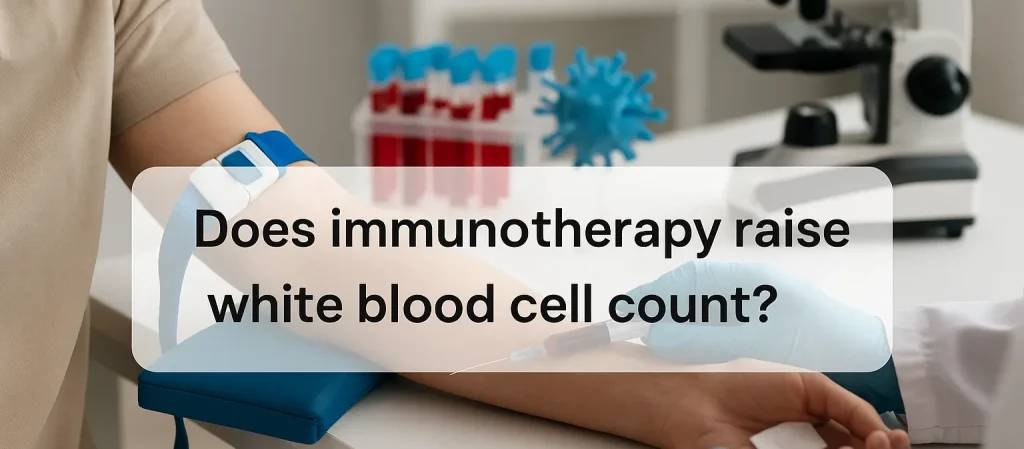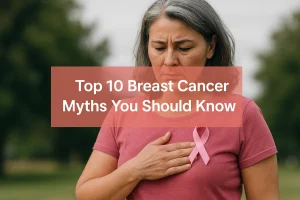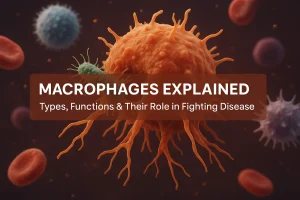
Does Immunotherapy Increase White Blood Cell Count? Effects, Benefits & Risks Explained
Immunotherapy is one of the advanced treatment techniques that has revolutionised Cancer treatment and has shown promising effects in cancer therapy. As the treatment progresses, the outcomes observed depend on the patient’s condition and the type of cancer, but the main question is, Does Immunotherapy increase the WBC count? Concerns arise about side effects, treatment effectiveness, and patient monitoring. This article provides comprehensive knowledge about the WBC role in Immunotherapy and how their levels are affected in detail.
What are White Blood Cells?
White Blood Cells(WBCs), or Leukocytes, are a crucial part of the Immune system. Their main role is to defend against infections, foreign antigens, and cancer cells in the body.
The five main types of WBC include
- Neutrophils- First Immune cells to arrive at the infection site
- Lymphocytes— It involves 3 types:
B cells- secrete antibodies against pathogens.
T cells- help other immune cells and kill antigens
Natural Killer (NK) Cells—Kill virus-infected cells and cancer cells - Monocytes- Become Macrophages and digest the pathogen and cellular debris.
- Eosinophils—They defend against parasitic infection, also contributing to allergic reactions.
- Basophils- Involved in allergic response and release histamine, which contributes to allergic responses like inflammation and itching.
What is the Normal Range of WBC count in adults?
The Normal range of WBC count in adults is generally between ~4,000 and 11,000 WBC per microliter of blood (µL). An Abnormal level could indicate infection, inflammation, or side effects of chemotherapy, Immunotherapy, etc.
Understanding What is Immunotherapy?
Immunotherapy is an advanced form of cancer treatment that educates the body’s immune system to fight against the cancerous cells during the treatment. It is much more effective than conventional therapies like Chemotherapy and has minimal side effects as well.
Types of Immunotherapy Include
- Checkpoint Inhibitors
- CAR T-cell Therapy
- Monoclonal antibodies
- Cytokine Therapy
- Cancer Vaccines
- Oncolytic Virus Therapy
Each of these types affects the Immune cell differently and can have a different effect on White Blood cells.
Does Immunotherapy Cause Any Side Effects?
Immunotherapy is the best form of cancer treatment. Unlike chemotherapy, which affects the normal cells, Immunotherapy precisely attacks the cancerous cells with minimal side effects, such as Nausea, fatigue, that can be resolved through diet and supplements.
Does Immunotherapy affect WBC levels?
WBC levels during immunotherapy vary based on treatment type, immune function, cancer type, and overall health. Here are the main types
Checkpoint Inhibitors—
These drugs block certain proteins that prevent T cells from attacking cancer cells. By doing so, they unleash the immune response against tumors.
1. Impact on WBCs:
Checkpoint inhibitors typically do not significantly increase overall WBC counts, but they can increase the activity or presence of specific types of immune cells, like activated T cells and lymphocytes.
Complications: In some patients, immune-related side effects like colitis, hepatitis, or pneumonitis may cause changes in blood counts.
Clinical note: Some patients may experience lymphocytosis (increased lymphocyte count), especially during early treatment.
2. CAR-T Cell Therapy:
This highly advanced therapy involves extracting a patient’s T cells, which are genetically modified and then infused to target cancer.
Impact on WBCs: CAR-T infusion may cause WBC counts to gradually rise, depending on bone marrow recovery and immune strength.
Common effect: Transient leukopenia (low WBCs) is common post-infusion. Over weeks to months, lymphocyte subsets may rebound, especially if treatment is effective.
3. Cytokine Therapy
It involves Interleukins and interferons that act as immune system messengers used to stimulate immune responses.
IL-2 (Interleukin-2): It can lead to lymphocytosis (an increase in lymphocytes) by promoting the proliferation of T cells and NK cells.
Interferon-alpha: May increase WBC count, especially lymphocytes, but can also cause neutropenia (low neutrophils) as a side effect in some patients.
Overall impact: Fluctuating WBC levels are common, often with spikes in lymphocytes during active therapy cycles.
4. Monoclonal Antibodies
These are the specialized lab-made antibodies that target specific proteins on cancer cells. For example, Rituximab, which targets CD20 on B cells, can lead to depletion of B lymphocytes, resulting in lymphopenia (low lymphocyte count).
Others, like trastuzumab or bevacizumab, typically don’t cause significant WBC alterations unless combined with chemotherapy.
5. Cancer Vaccines
They are designed to enhance the immune system to recognize cancer-specific antigens more effectively, causing Minimal changes in overall WBC count; however, there may be increased activation of antigen-specific T cells, not usually visible on a basic blood test.
6. Oncolytic Virus Therapy
This includes the engineered viruses that infect and kill cancer cells while stimulating immune responses. Some studies show increased immune infiltration in tumors, but no consistent changes in peripheral WBC counts
What are the Clinical Observations and Studies?
Checkpoint Inhibitors:
A study in NSCLC patients on nivolumab showed that patients with baseline lymphocytosis responded better to treatment. (Read here)
Another trial shows that transient lymphocyte elevation after treatment initiation was seen in ~25% of patients.
CAR-T Therapy:
WBC counts fall significantly after lymphodepletion, then gradually normalize over 2–6 weeks post-infusion.
B-cell aplasia (lack of B cells) can persist for months, especially with anti-CD19 therapies.
IL-2 Therapy:
High-dose IL-2 for melanoma or kidney cancer is well-known to cause marked lymphocytosis during treatment, often more than 3x baseline. This spike often correlates with immune activation, but not always with better outcomes.
What are the Factors affecting WBC count?
Some of the Factors include:-
1. Immunotherapy type: Some therapies, like IL-2 or CAR-T, affect WBC counts more than others.
2. Combined Therapy: Many patients receive combined Immunotherapy with Chemotherapy to enhance the effect, especially in lung, breast, and lymphoma treatment. Chemotherapy often lowers WBC counts, which may mask any WBC-increasing effect of immunotherapy.
3. Infection or Inflammation: If a patient develops an infection or immune-related inflammation (e.g., colitis), WBC counts may spike as part of the body’s response.
4. Bone Marrow: In patients with bone marrow involvement (like leukemia or lymphoma), the WBC production is compromised. Immunotherapy may help in the long term, but not immediately.
5. Immunosuppressive agents: Steroids are sometimes used to manage side effects of immunotherapy, which can lower lymphocyte counts.
How to Manage WBC Count?
- Lifestyle and health: Do regular exercise and incorporate a healthy diet rich in protein, Vitamin B12 and folate, and iron.
- Maintain Hygiene: Keep your hygiene good if your WBCs are low, and even in crowds.
- Be hydrated: Drink plenty of water, as it helps improve immunity and support healing.
- Regular Monitoring: Monitor your WBC levels through the CBC test, which helps you detect the level and gives you complete tracking of your health.
- Medical Evaluation: Don’t self-treat the abnormal WBC count; always consult with your doctor for better recovery.
Overview
Here is the summary for the type of Immunotherapy affecting WBC levels in tabular form.
| Type of Immunotherapy | Likely Effect on WBCs |
| Checkpoint Inhibitors | Mild increase in lymphocytes; not always significant |
| CAR-T Therapy | Initial drop, then recovery; lymphocytes may rise |
| IL-2/Interferons | Often increases lymphocytes |
| Monoclonal Antibodies | Target dependent; may lower B cells |
| Vaccines | Minimal WBC may change |
| Oncolytic Viruses | Variable: Under Investigation |
A key takeaway:
While immunotherapy treats cancer by boosting the immune system, some types can affect white blood cell counts, which increases the risk of infection. On the other hand, by activating the immune system, some types may increase certain white blood cell subsets (such as eosinophils or certain neutrophils) as part of the anti-tumor response or even cause an overactive immune system (cytokine release syndrome), which may involve changes in white blood cell levels. As a result, the impact on white blood cell count may differ depending on the particular immunotherapy and patient response.
Frequently Asked Questions
Can Cancer Cause Low WBC Count?
Not all types of cancer, but Lung cancer causes infections like bronchitis and Pneumonia that can happen along with cancer, which leads to increased WBC count to fight these infections.
Does a low WBC sign indicate that Immunotherapy is not working?
Not always; the WBC level may fluctuate due to many factors, and you can monitor the condition through Imaging or clinical response.
Does Immunotherapy affect neutrophils?
Less commonly, some therapies may cause neutropenia, especially with combined therapies such as chemotherapy or steroids.
- Is Vaping Harmful? Risks, Myths & Medical Facts Explained
- Cancer-Related Neutropenia: Causes and Effects on White Blood Cells







